ABOLISH Lèse-majesté
ABOLISH MONARCHY
Thai court grants Thaksin bail, other politically charged cases to be heard in July
Panu Wongcha-um
Updated Tue, 18 June 2024
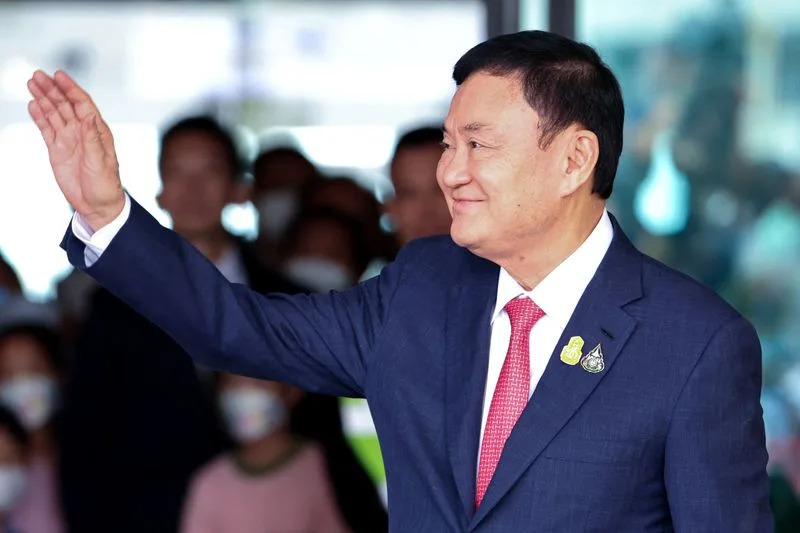
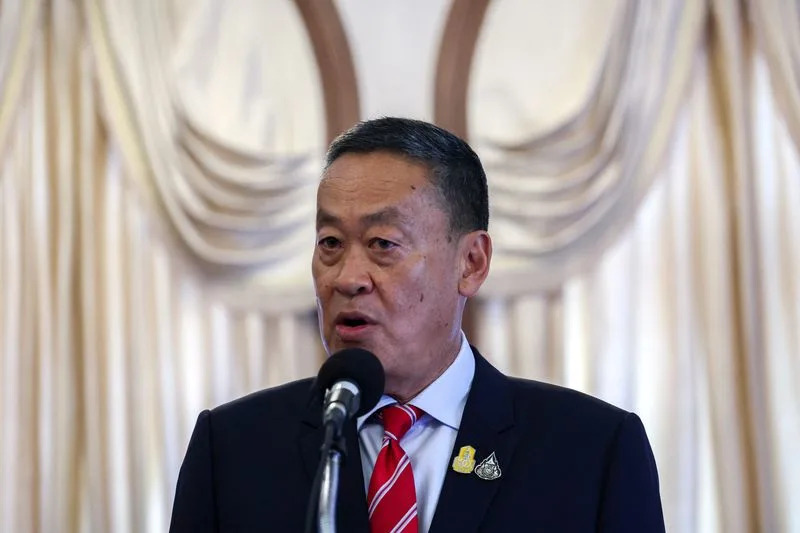
Exiled former PM Thaksin returns to Thailand
By Panu Wongcha-um
BANGKOK (Reuters) -Thailand's influential former prime minister Thaksin Shinawatra, a powerful backer of the largest party in the governing coalition, avoided pre-trial detention for allegedly insulting the monarchy after a criminal court granted him bail on Tuesday.
Separately, the Constitutional Court set July 3 and July 10, respectively, as the next hearing dates for two cases involving the opposition Move Forward party and the incumbent prime minister Srettha Thavisin.
Srettha, a political novice who took office last year, faces potential dismissal over a cabinet appointment.
The Move Forward party, which won last year's closely fought election but was unable to form a government, could be dissolved for its campaign to amend the royal insult law.
Thaksin, Srettha and Move Forward deny any wrongdoing.
The Constitutional Court also ruled that an ongoing selection process for a new upper house, which started earlier this month, is lawful, clearing the deck for 200 new lawmakers to take over from a military appointed senate later this year.
The court cases, which risk deepening a decades-old rift between the conservative-royalist establishment and its opponents, such as the populist ruling Pheu Thai party and the Move Forward party, have raised the spectre of political instability and rattled markets.
Thailand's main stock index, which dropped to its lowest level since November 2020 on Monday, gained more than 1% on Tuesday morning before trimming gains.
(Reporting by Panu Wongcha-um, Panarat Thepgumpanat, Chayut Setboonsarng and Orathai Sriring; Writing by Devjyot Ghoshal; Editing by John Mair and Ed Davies)
Thai Royalists Make Risky Bet in Fresh Showdown With Thaksin
Patpicha Tanakasempipat
Sun, 16 June 2024
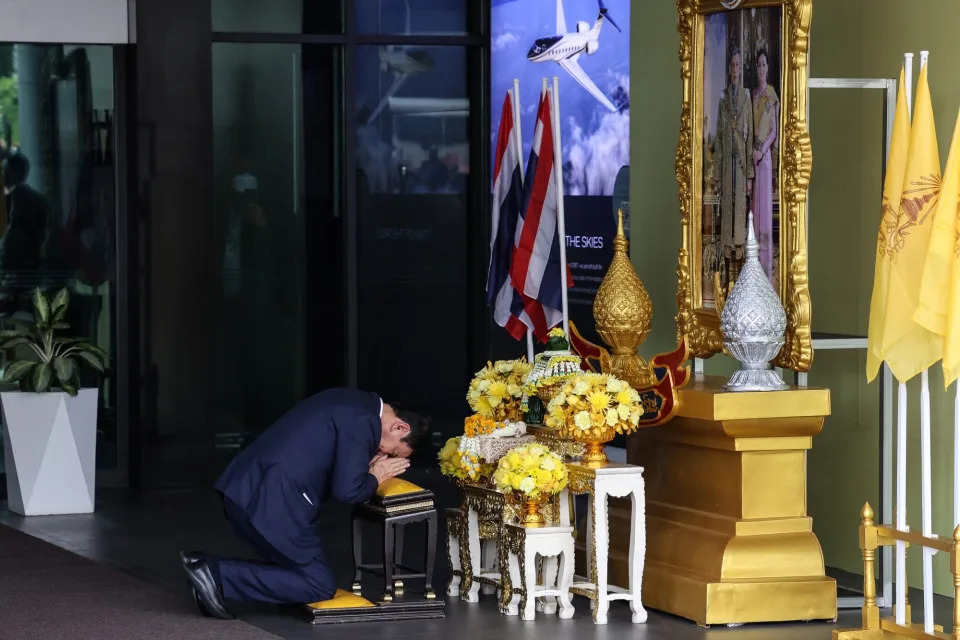
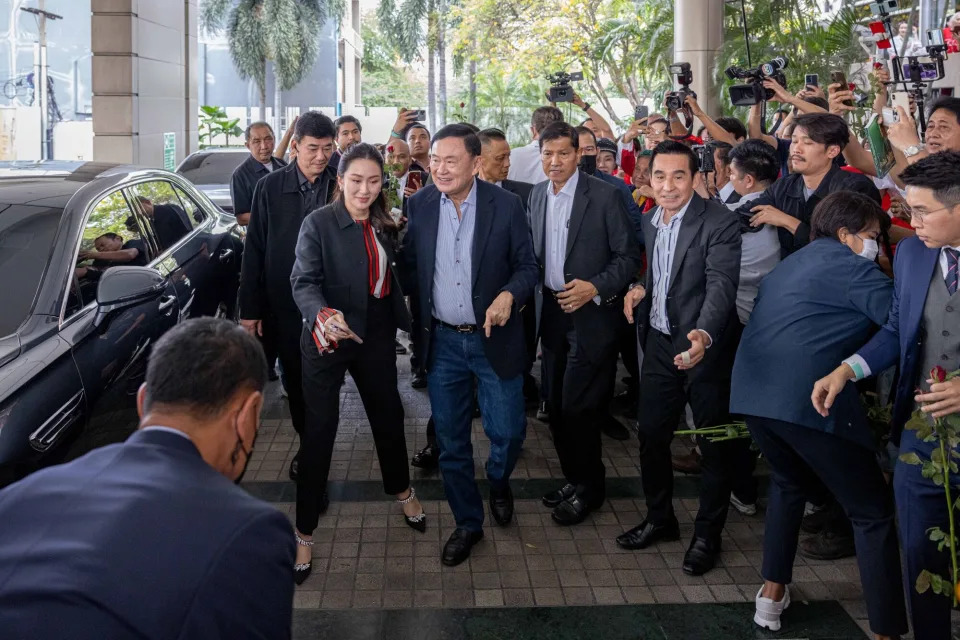
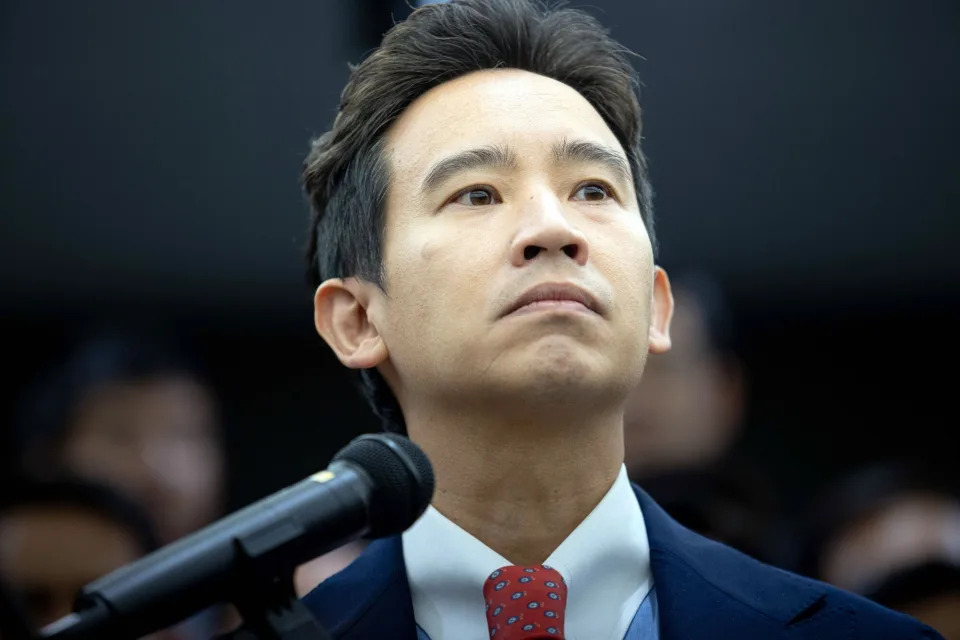
(Bloomberg) -- Last August, former Thai leader Thaksin Shinawatra returned to his homeland after 15 years in exile following a deal with royalists who once ousted him in a coup. That marriage of convenience is now at risk of falling apart, potentially unleashing more political turmoil.
Members of Thaksin’s ruling Pheu Thai party aren’t sure whether that deal still holds, according to people familiar with the situation, who asked not to be identified discussing sensitive matters. While they are optimistic the government will survive, they won’t know for sure until courts decide on separate legal cases involving both Thaksin, who could be thrown in jail, and Prime Minister Srettha Thavisin, an ally who faces possible disqualification, the people said.
When that might happen is unclear. Thailand’s Constitutional Court plans to meet again on Tuesday to consider more evidence on a petition filed by 40 senators seeking to remove Srettha, 62, over allegations of ethical violations. On the same day, Thaksin, 74, is set to be indicted in a royal defamation case. The proceedings in both cases could move quickly or still drag on for months.
If that wasn’t complicated enough, the Constitutional Court is concurrently hearing a case on whether to disband the pro-democracy Move Forward party over its pledge to amend Thailand’s lese majeste law, which forbids criticism of King Maha Vajiralongkorn and other top royals. The party, which won the most seats in last year’s election, is seen as the biggest threat to the royalist establishment, and kneecapping it risks triggering more street protests.
“It would be improper of me to discuss what’s to come in the future,” Srettha told reporters in Bangkok last week when asked about the cases.
The uncertainty is rattling investors who once cheered the possibility that Thailand may finally see more political stability. Foreign funds have pulled more than $3 billion from local markets this year, sending the nation’s benchmark SET Index to a four-year low. It’s now the worst performer of all global bourses tracked by Bloomberg in the past year.
Thaksin so far has little to show from joining hands with his former enemies. Dissatisfaction is growing with Srettha’s government as it struggles to implement campaign pledges to hand out cash, help farmers deal with debt and raise the minimum wage, all while targeting annual economic growth of 5%. It has also sought to strong-arm the central bank into cutting interest rates to spur the economy, which the World Bank forecasts will fail to expand at an annual pace greater than 3% through 2026.
Why this is all happening now — and just how much the legal cases are connected — is the subject of much speculation in Bangkok. Thaksin’s opponents don’t have a clear path to forming a stable government unless they stage yet another military coup, a scenario that can’t be ruled out in a nation that has had about a dozen of them since ending absolute monarchy in 1932.
One theory is that the royalist establishment wants to rein in Thaksin, who has kept a high profile since he was freed from detention in February after King Vajiralongkorn commuted his eight-year jail sentence for corruption to just a year. Thaksin has been a constant presence on television, meeting with hordes of supporters, ministers and officials. He also attempted to broker a peace agreement in Myanmar and met with Malaysian leader Anwar Ibrahim in a bid to resolve a longstanding insurgency in southern Thailand.
Although Thailand’s conservatives may depend on Thaksin for now to counter Move Forward’s rapid rise in popularity, his ambitions are increasingly breaking trust with the establishment, according to Teerasak Siripant, managing director at BowerGroupAsia in Bangkok.
“Since Thaksin’s return, there were expectations from the establishment about what he should or shouldn’t do,” Teerasak said. “They had expected him to be behind the scenes, but that’s clearly not what’s happening. We’re seeing the same image that we have long had of him: he wants to be someone great in Thai society.”
While Thaksin’s royal pardon was the clearest sign of a behind-the-scenes deal, the terms of any agreement remain a mystery. Not much has fundamentally changed since Pheu Thai joined forces with royalist military-backed parties last year: Both still need each other to form a government that doesn’t include Move Forward, whose stronger-than-expected performance in last year’s election represented a slap in the face to the royalists — and a challenge to Thaksin’s electoral dominance.
Thaksin has strongly denied any wrongdoing, publicly blaming his lese majeste case on “the man in the forest” — a nickname referring to former army chief Prawit Wongsuwan, 78, who served as deputy junta leader after a 2014 coup that ousted the government of Thaksin’s sister, Yingluck Shinawatra. A party official deflected questions from reporters about Thaksin’s comment regarding Prawit, who now leads the conservative Palang Pracharath Party in the ruling coalition and has long headed the military’s Forest Preservation Foundation.
“The case is baseless — it’s fruit from a toxic tree,” Thaksin told reporters on June 8, in his first public comments about his legal troubles, which stem from remarks he made in 2015 in the wake of the military takeover. “It’s an example that shows how charges are abused after a coup.”
Thaksin’s remarks can be interpreted in a number of ways, the people familiar said: Either he’s confident the deal that brought him back to Thailand is still intact and he feels protected, or he’s sending a warning shot to the establishment that he’s ready to fight if they lock him up again, or that he’s looking for a scapegoat and signaling he’ll fall in line.
Thaksin similarly blamed Prawit for orchestrating the case against Srettha. The senators backing the petition came together on their shared frustrations over Thaksin, and some of them aim to pressure him into accepting a conservative leader, according to people familiar with the situation.
Although the petition was backed by a small fraction of the 250-member military-appointed Senate, it’s now one of several moving parts that could bring down the government. The senators who initiated the petition are betting that Thaksin would still keep the coalition together and reluctantly back a conservative for prime minister, because he doesn’t want to go to jail and still wants to bring his sister Yingluck, 56, back from exile.
But that is a big gamble. If Srettha is disqualified, only seven people are eligible to become prime minister, including Prawit. The two options from Thaksin’s camp are his 37-year-old daughter, Paetongtarn Shinawatra, and 75-year-old Chaikasem Nitisiri. Both are believed to be long shots: it’s unclear if Thaksin wants to expose one of his children to the messiness of Thai politics at the moment, while the latter has had serious health issues in recent years.
If it’s not someone from Pheu Thai, Thaksin could pull the party out of the coalition and seek to link up with Move Forward. Although there is bad blood between the parties, and that scenario remains unlikely, together they would control a majority in the lower house of parliament.
In that case, they would likely back 43-year-old Pita Limjaroenrat, an outcome the royalist establishment would want to avoid. That’s why the Move Forward dissolution case is so important: If the party is disbanded, Pita wouldn’t be able to stand as prime minister.
In a scenario in which Thaksin doesn’t support the conservatives and can’t form a government with Move Forward, it would likely lead to a fresh election. And given that anti-establishment parties won nearly 60% of seats in an election a year ago, that’s a risky proposition for the military-backed conservatives.
By going after Thaksin, the royalist elites got themselves into a conundrum, according to Thitinan Pongsudhirak, a professor of political science at Chulalongkorn University in Bangkok. The most likely scenario, he added, is that they let Thaksin off in the end.
“They don’t want Move Forward to be in government, but now they’ve got a Pheu Thai government that they are undermining directly,” Thitinan said. “They want to teach Thaksin a lesson. But it depends on how he responds.”
--With assistance from Philip J. Heijmans.
©2024 Bloomberg L.P.
Four Thai court cases that could spark political crises
Reuters Videos
Updated Mon, 17 June 2024
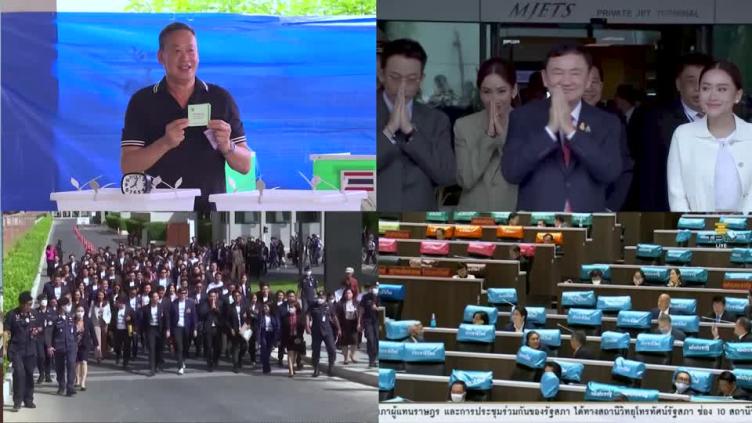
STORY: Thailand is facing a critical week of four court cases that could unleash a political crisis, with the fate of the prime minister and the main opposition hanging in the balance.
Thai politics has been defined by decades of struggle between its military-supported, conservative-royalist establishment clashing with populist parties like those backed by Thaksin Shinawatra and now a new, and progressive, opposition.
Each case this week is wrapped up in that tension.
Here's what you need to know about them.
:: How is the Prime Minister involved?
Prime Minister Srettha Thavisin has been accused by a group of conservative senators of breaching the constitution when he appointed a former lawyer with a conviction record to his cabinet.
He denies wrongdoing.
He only took power in August, but could face dismissal if the Constitutional Court rules against him.
If he is removed from office, a new government must be formed.
The court will likely announce the next hearing or verdict date on Tuesday (June 18).
:: The case against the former premier
Thaksin Shinawatra, the influential former premier who was ousted in a 2006 military coup, is to be formally indicted Tuesday in a Bangkok criminal court on several charges, including allegedly insulting the monarchy in a 2015 interview.
Criticism of the monarchy is forbidden under Thailand's tough lese-majeste law, which carries a maximum jail sentence of up to 15 years for each perceived royal insult.
After the indictment, the court will then decide whether or not to grant bail to the 74-year-old billionaire politician, who denies wrongdoing.
:: Opposition under threat?
Another case could lead to the dissolution of the progressive Move Forward party.
The opposition party holds 30% of seats in the lower house after winning last year's closely-fought election but was blocked by conservative lawmakers from forming a government.
The Constitutional Court is considering an Election Commission complaint that alleges the Move Forward party breached the constitution with an attempt to reform the country's royal insult law.
The party denies any wrongdoing.
The court is expected to announce the next hearing or verdict date on Tuesday.
:: What about the Senate election?
The Constitutional Court will also rule on Tuesday on a petition challenging the legality of the process to select a new 200-member Senate.
If the process is canceled or delayed, it would temporarily extend the term of the current Senate, which was hand-picked by the military after the 2014 coup.
Military-appointed lawmakers have been central in determining government formation, including last year’s maneuver to block Move Forward from forming a government.
Thailand's ex-PM Thaksin Shinawatra indicted for defaming monarchy
NEWS WIRES
Tue, 18 June 2024 at 12:05 am GMT-6·1-min read
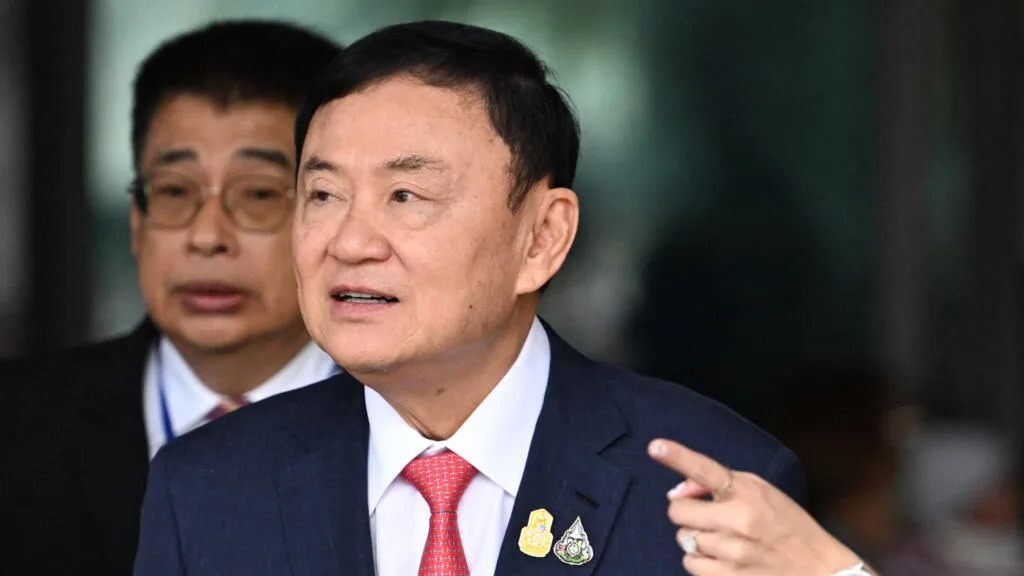
Former Thai Prime Minister Thaksin Shinawatra was granted release on bail hours after he was formally indicted Tuesday on a charge of defaming the country's monarchy in one of several court cases that have unsteadied Thai politics.
Thaksin, an influential political figure despite being ousted from power 18 years ago, reported himself to prosecutors Tuesday morning and was indicted, Prayuth Bejraguna, a spokesperson for the Office of the Attorney General, said at a news conference.
A car believed to be carrying Thaksin arrived at the Criminal Court in Bangkok but he did not come out to meet reporters. His lawyer Winyat Chatmontree told reporters that Thaksin was ready to enter the judicial process.
A few hours later, the Criminal Court said Thaksin's bail release was approved with a bond worth 500,000 baht ($13,000) under a condition that he cannot travel out of Thailand unless he receives permission from the court. The same car left the court shortly after without Thaksin being seen.
The law on defaming the monarchy, an offense known as lese majeste, is punishable by three to 15 years in prison. It is among the harshest such laws globally and increasingly has been used in Thailand to punish government critics.
Thaksin, now 74, was ousted by an army coup in 2006 that set off years of deep political polarization. His opponents, who were generally staunch royalists, had accused him of corruption, abuse of power and disrespecting then-King Bhumibol Adulyadej, who died in 2016.
(AP)
Thaksin, Thai PM Caught Up in Legal Cases as Crisis Deepens
Anuchit Nguyen, Pathom Sangwongwanich and Janine Phakdeetham
Tue, 18 June 2024 at 1:40 am GMT-6·4-min read
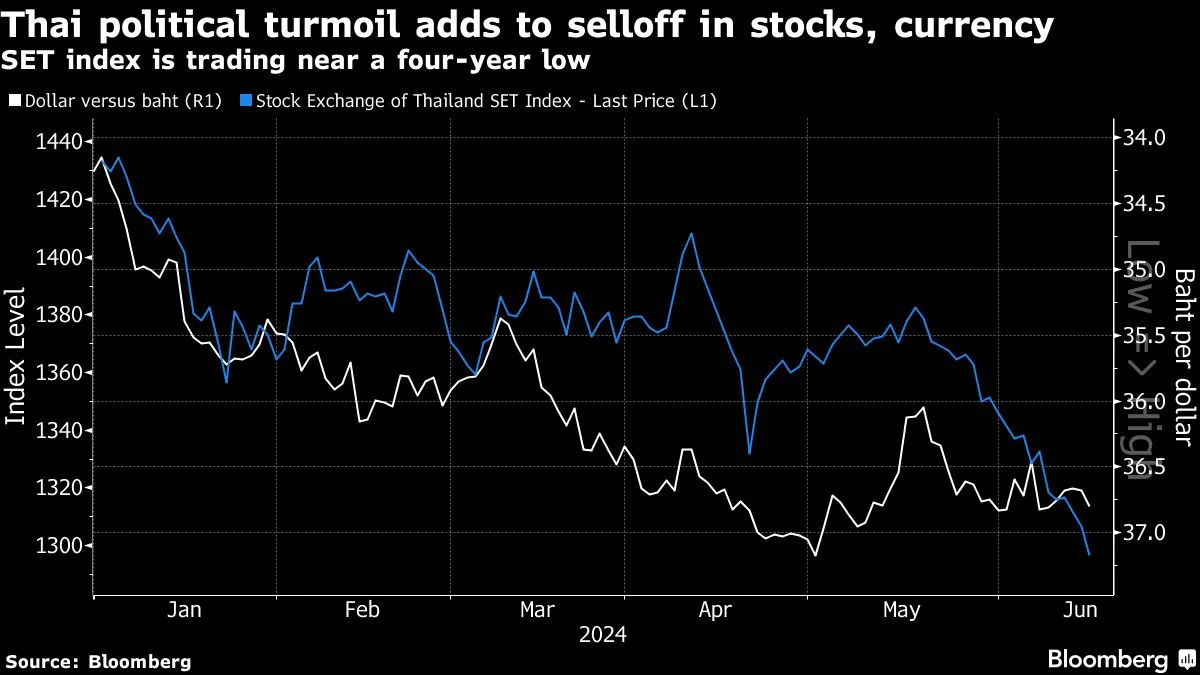
(Bloomberg) -- Former Thai leader Thaksin Shinawatra faces a trial in a royal insult case while a top court ordered his ally and Prime Minister Srettha Thavisin to submit more evidence in a case seeking his ouster, deepening a political crisis that’s gripped the Southeast Asian nation.
Thaksin, a two-time former prime minister and the de facto leader of the ruling Pheu Thai party, was arraigned under Thailand’s stringent lese majeste law that protects the royal family from criticism. The 74-year-old politician was granted bail after his lawyer posted a 500,000 baht ($13,590) bond.
Read: Thai Royalists Make Risky Bet in Fresh Showdown With Thaksin
Hours after Thaksin was indicted, Thailand’s Constitutional Court asked Srettha — who heads the Pheu Thai-led coalition government — to furnish more documents and evidence in the case seeking his removal. This was in relation to allegations of ethics violations in appointing a cabinet minister who spent time in prison.
While the outcomes of the cases are far from certain, the litigations pose risks to Srettha’s government that was formed in the aftermath of last year’s messy general election. They also signal the possible unraveling of a deal that saw Pheu Thai and a clutch of pro-royalist and military-aligned parties joining hands to take power and paved the way for Thaksin’s return from a 15-year exile.
The political uncertainty have rattled Thailand’s financial markets, prompting foreign investors to pull almost $4 billion from the nation’s stocks and bonds. The benchmark SET Index of stocks has slumped to a near four-year low, ranking it the worst-performer of all global bourses tracked by Bloomberg in the past year, while the baht is Asia’s worst performer after the Japanese yen this year.
“Rising political risks have dampened any investor optimism about Thailand’s quick economic recovery,” said Varorith Chirachon, an executive director at SCB Asset Management Co. “The lingering legal cases against Srettha and key political parties will probably derail government’s attempts and focus in implementing much-needed economic policies and stimulus.”
The Thai stocks index pared gains in the afternoon session when it got a chance to react to court news. It ended morning session 1% higher but is now down 0.6%.
The charges against Thaksin, 74, stem from an interview he gave in Seoul in 2015 that prosecutors deemed had breached Article 112 of Thailand’s penal code. It carries a maximum jail term of 15 years for each offense of defaming the monarchy.
The attorney general last month decided to indict Thaksin, saying there was enough evidence to press ahead with a trial. Thaksin has rejected the charges and his lawyer has vowed to contest the case in the court.
“The case is baseless — it’s fruit from a toxic tree,” Thaksin told reporters on June 8, in his first public comments about his legal troubles, which stem from remarks he made in 2015 in the wake of the military takeover. “It’s an example that shows how charges are abused after a coup.”
The court seized Thaksin’s passport and ordered him to be present on Aug. 19 when it will begin scrutinizing the evidence in the case.
Thaksin is currently on parole after being sentenced in corruption cases. He’s due to walk free after his royally commuted jail term ends in August.
He held the country’s top political office from 2001 until being ousted in a 2006 coup. His sister Yingluck Shinawatra, whose government was overthrown by a coup, remains in exile after leaving Thailand in 2017 before a court sentenced her to five years in prison for dereliction of duty over a controversial rice purchase program.
Srettha’s Troubles
The legal trouble for Srettha meanwhile arises from a petition by a group of 40 senators who alleged “serious violation of ethical standards” in the April appointment of Pichit Chuenban, a former lawyer for the influential Shinawatra family. Pichit was not qualified to become a minister after being sentenced to six months in jail in 2008 for attempting to bribe court officials while representing Thaksin, according to the senators.
Although Pichit resigned from the cabinet last month, saying he wanted to save Srettha from any legal troubles, it hasn’t stopped the court from probing the accusation against the prime minister. Srettha has said he was confident he could weather the court scrutiny, adding that his decision to appoint Pichit followed the law.
Srettha now has 15 days to furnish fresh evidence. The court will review the case again on July 10.
The constitutional court will also resume hearing a case on whether to disband the pro-democracy Move Forward party over its pledge to amend Thailand’s lese majeste law on July 3, it said in a statement. The party, which won the most seats in last year’s election, is seen as the biggest threat to the royalist establishment.
Move Forward has said it plans to “fight tooth and nail” against the dissolution threat, saying its loss would amount to an attack on democracy.
Bloomberg Businessweek

No comments:
Post a Comment